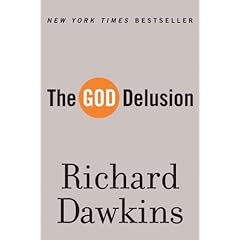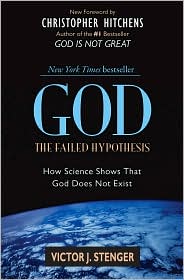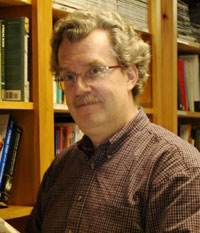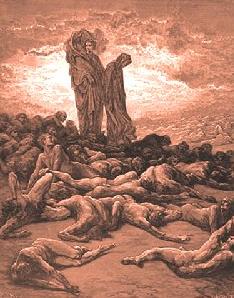

"When men stop believing in God, it isn't that they then believe in nothing: they believe in everything." ~UMBERTO ECO, (Foucault's Pendulum)


 Gregory Boyd. He's a man of great learning, insight, and dedication. A former atheist, he became a Christian in 1974, and eventually gratuated from Princeton Theological Seminary with a Ph. D. He's a formidable philosopher, a top-notch theologian, author of many scholarly and popular books, a former professor of theology, and currently a pastor at Woodland Hills Church in St. Paul, Minnesota.
Gregory Boyd. He's a man of great learning, insight, and dedication. A former atheist, he became a Christian in 1974, and eventually gratuated from Princeton Theological Seminary with a Ph. D. He's a formidable philosopher, a top-notch theologian, author of many scholarly and popular books, a former professor of theology, and currently a pastor at Woodland Hills Church in St. Paul, Minnesota. And once again, we turn to Authority and the Church. Tim's comments will be in red and mine in black. Also, on the issue of authority and the church, I will be having a formal debate with a Roman Catholic lay apologist in the near future. We will be debating the relevance and validity of the papacy. I'm sure you can figure out what side of the debate I'll be taking up. For now, enjoy this series, and the series on Coyne.
And once again, we turn to Authority and the Church. Tim's comments will be in red and mine in black. Also, on the issue of authority and the church, I will be having a formal debate with a Roman Catholic lay apologist in the near future. We will be debating the relevance and validity of the papacy. I'm sure you can figure out what side of the debate I'll be taking up. For now, enjoy this series, and the series on Coyne. It came to my attention today as I was watching The Root of All Evil -- a documentary by famed atheist biologist Richard Dawkins -- that religious fanaticism in America is indeed a sick and grotesque parody of the message of love, and non-judgmentalism that Christ demonstrated. Dawkins brought to light the oppressive, fear-based tactics of a particular group of fundamentalist evangelicals who caper about under the name Hell House Outreach. This particular brew of insanity purposefully sets out to frighten people -- children in particular -- into belief in God.
It came to my attention today as I was watching The Root of All Evil -- a documentary by famed atheist biologist Richard Dawkins -- that religious fanaticism in America is indeed a sick and grotesque parody of the message of love, and non-judgmentalism that Christ demonstrated. Dawkins brought to light the oppressive, fear-based tactics of a particular group of fundamentalist evangelicals who caper about under the name Hell House Outreach. This particular brew of insanity purposefully sets out to frighten people -- children in particular -- into belief in God. As promised, here is Kenneth R. Miller's reflections on Jerry Coyne's Seeing And Believing, an essay that posits science and religion will never be reconciled.
As promised, here is Kenneth R. Miller's reflections on Jerry Coyne's Seeing And Believing, an essay that posits science and religion will never be reconciled. I have posted two articles (with more to come) that offer critical reflections on Jerry Coyne's article Seeing And Believing. In that article, Coyne deals most specifically with two "Darwinian churchgoers": Karl W. Giberson, and Kenneth R. Miller. The following two articles will be critical reflections from both Giberson and Miller themselves in response to Coyne.
I have posted two articles (with more to come) that offer critical reflections on Jerry Coyne's article Seeing And Believing. In that article, Coyne deals most specifically with two "Darwinian churchgoers": Karl W. Giberson, and Kenneth R. Miller. The following two articles will be critical reflections from both Giberson and Miller themselves in response to Coyne. Christopher Hitchens's international bestseller god is not Great: How Religion Poisons Everything is a poignant but embittered look at the effects and influence of religion in history, and the modern world. I commented briefly about the book a while ago in an article called "The Muppets and Christopher Hitchens". Still, I think Eric Reitan gives voice to one of the major flaws of Hitchens's work in the following quote:
Christopher Hitchens's international bestseller god is not Great: How Religion Poisons Everything is a poignant but embittered look at the effects and influence of religion in history, and the modern world. I commented briefly about the book a while ago in an article called "The Muppets and Christopher Hitchens". Still, I think Eric Reitan gives voice to one of the major flaws of Hitchens's work in the following quote:But to say these things requires an account of what I mean by "religion." Instead of offering his own account, Hitchens' strategy seems to be this: if it is good, noble, or tends to inspire compassion, then it isn't "religion." It is "humanism" or something of the sort. With no clear definition to guide him, Hitchens is free to locate only what is cruel, callous, insipid, or banal in the camp of religion, while excluding anything that could reliably motivate the heroic moral action exemplified by Bonhoeffer and King. When "religion" is never defined, but in practice is treated so that only what is poisonous qualifies, it becomes trivially easy to conclude that "religion poisons everything."
IS GOD A DELUSION? A REPLY TO RELIGION'S CULTURED DESPISERS (WILEY-BLACKWELL: DEC. 3, 2008), P. 19.
 Protestants reject out-of-hand the notion of 'purgatory'. Purgatory is said to be a Roman Catholic conjuring having nothing to do with the economy of God. With the advent of Luther's Reformation (AD 1517 --->), a theological tradition that considers the refining fires believers go through before entrance into heaven was summarily trashed. In its place was drafted what I call a 'punctuated sanctification'. That is, the notion that salvation through Christ instantaneously absolves one of all one's sins, that they are 'new creatures' (II Cor. 5:17-18) already fit for eternity in heaven with God.
Protestants reject out-of-hand the notion of 'purgatory'. Purgatory is said to be a Roman Catholic conjuring having nothing to do with the economy of God. With the advent of Luther's Reformation (AD 1517 --->), a theological tradition that considers the refining fires believers go through before entrance into heaven was summarily trashed. In its place was drafted what I call a 'punctuated sanctification'. That is, the notion that salvation through Christ instantaneously absolves one of all one's sins, that they are 'new creatures' (II Cor. 5:17-18) already fit for eternity in heaven with God. It's been a while, but I thought I'd revisit the issue of authority and the church. The first two installments of this debate I entertained are here, and here. My comments will be in black, and TJG's will be in red.
It's been a while, but I thought I'd revisit the issue of authority and the church. The first two installments of this debate I entertained are here, and here. My comments will be in black, and TJG's will be in red. It is the nature of fundamentalists to bottom-line their thinking as far as they are able. There is emotional security in holding to what one perceives as an inviolable interpretation of reality. So when an equal opposing claim to reality makes itself known, it is inevitable that philosophical claims to reality will clash. It is just this phenomenon that Coyne has identified when he notes the bipolar culture of evangelicals and the 'new atheists'. Says Chris Hedges in When Atheism Becomes Religion,
It is the nature of fundamentalists to bottom-line their thinking as far as they are able. There is emotional security in holding to what one perceives as an inviolable interpretation of reality. So when an equal opposing claim to reality makes itself known, it is inevitable that philosophical claims to reality will clash. It is just this phenomenon that Coyne has identified when he notes the bipolar culture of evangelicals and the 'new atheists'. Says Chris Hedges in When Atheism Becomes Religion,With two opposing streams of fundamentalism equally certain that their views of reality are the only reliable views, the atmosphere for dialogue is squelched, and reconciliation is necessarily impossible. The same idea is borne out in common conversation: if two people are unwilling to lay aside their differences in order to establish effective, meaningful communication – communication that both parties can benefit from – then reconciliation is not possible."Fundamentalism is a mind-set. The iconography and language it employs can be either religious or secular or both, but because it dismisses all alternative viewpoints as inferior and unworthy of consideration it is anti-thought. This is part of its attraction. It fills a human desire for self-importance, for hope and the dream of finally attaining paradise. It creates a binary world of absolutes, of good and evil. It provides a comforting emotional certitude."1
...some of the tensions disappear when the literal reading of the Bible is renounced, as it is by all but the most primitive of JudeoChristian sensibilities. But the tension remains. The real question is whether there is a philosophical incompatibility between religion and science. Does the empirical nature of science contradict the revelatory nature of faith? Are the gaps between them so great that the two institutions must be considered essentially antagonistic? The incessant stream of books dealing with this question suggests that the answer is not straightforward.
Or, to put it another way, there is no way to prove a connection between cause and effect, that B was caused by A. It is a correlation that is assumed but not universally fixed, as Hume was keen to note. Thus empirical science and religion both hinge on faith-based assumptions. Accordingly, if both factions are willing to admit that particular bridge between their respective gaps, reconciliation is not only possible, but already exists and awaits our recognition."If I say all swans are white and posit that as a scientific hypothesis, how would I go about verifying it? By checking out swans. A million swans. Or ten million. Based on this I can say confidently that all swans are white. Hume's point is that I really don't know this. Tomorrow I might see a black swan, and there goes my scientific law."3
 Jerry Coyne is a professor at the University of Chicago in the Department of Ecology and Evolution. He is the author of the recent book Why Evolution Is True. On February 9, 2009, Coyne published a paper through The New Republic called Seeing and Believing. In this paper, Coyne defends the thesis that science and religion will never reconcile despite on-going efforts toward that end. In particular, he relies on the work of two prominent scientists – who also happen to be Christians – Karl W. Giberson (Saving Darwin: How to be a Christian and Believe in Evolution) and Kenneth R. Miller (Only a Theory: Evolution and the Battle for America's Soul), who have made concerted efforts at establishing harmony between science and religion.
Jerry Coyne is a professor at the University of Chicago in the Department of Ecology and Evolution. He is the author of the recent book Why Evolution Is True. On February 9, 2009, Coyne published a paper through The New Republic called Seeing and Believing. In this paper, Coyne defends the thesis that science and religion will never reconcile despite on-going efforts toward that end. In particular, he relies on the work of two prominent scientists – who also happen to be Christians – Karl W. Giberson (Saving Darwin: How to be a Christian and Believe in Evolution) and Kenneth R. Miller (Only a Theory: Evolution and the Battle for America's Soul), who have made concerted efforts at establishing harmony between science and religion.The cultural polarization of America has been aggravated by attacks on religion from the “new atheists,” writers such as Richard Dawkins and Daniel Dennett, who are die-hard Darwinists. Outraged religious leaders, associating evolutionary biology with atheism, counterattacked. This schism has distressed liberal theologians and religious scientists, who have renewed their efforts to reconcile religion and science.
"If we want to postulate a deity capable of engineering all the organized complexity in the world, either instantaneously or by guiding evolution, that deity must already have been vastly complex in the first place. The creationist, whether a naive Bible-thumper or an educated bishop, simply postulates an already existing being of prodigious intelligence and complexity. If we are going to allow ourselves the luxury of postulating organized complexity without offering an explanation, we might as well make a job of it and simply postulate the existence of life as we know it!"
Richard Dawkins, The Blind Watchmaker (New York: W.W. Norton, 1986), p. 316.
 There used to be a time when education was for its own sake. People desired education because they wanted to know, to understand, to gain wisdom, and to have something to pass on to those they know and love. Times change -- an obvious fact to any who have breath, intellect, and the privilege to live to a semi-aware stage of the I; that is, the self in relation to things, and others.
There used to be a time when education was for its own sake. People desired education because they wanted to know, to understand, to gain wisdom, and to have something to pass on to those they know and love. Times change -- an obvious fact to any who have breath, intellect, and the privilege to live to a semi-aware stage of the I; that is, the self in relation to things, and others.